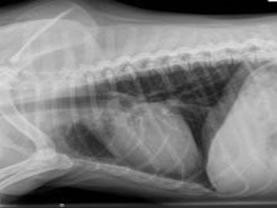Dogs, like people, can also develop asthma. Asthma in dogs is more commonly referred to as allergic bronchitis. It usually includes wheezing and shortness of breath due to spasms and constriction of the upper airways. The condition is caused by an allergic reaction to something in the environment, which causes an inflammatory response in the upper airways.
Symptoms of Canine Asthma
Canine allergic bronchitis tends to affect young to middle-aged dogs with older animals occasionally affected also. The typical sign is an ongoing, dry hacking cough. Other common signs include:
* Difficulty breathing
* Shortness of breath
* Wheezing
* Open-mouth breathing
* Cough
* Pale mucous membranes
* Lethargy
* Exercise intolerance
* Lack of appetite
* Weight loss
Asthma is less common in dogs than in cats and the symptoms can range from mild to severe. Fortunately this condition can often be effectively treated with medication.
Allergens contributing to Canine Asthma
Allergens include:
* Cigarette or cigar smoke
* Fumes from wood burning stoves or fireplaces
* Carpet or floor cleaners
* Deodorizers
* Air fresheners
Treatment
Although canine allergic bronchitis is uncommon in dogs, when it does occur it can be distressing to owners and the affected animals. The goal of treating asthma is to identify and remove the inciting allergens. There are however a number of treatment options available to help manage and minimise the consequences of this disorder.
Dogs with asthma should be treated aggressively to minimise long-term airway inflammation and resulting chronic bronchial damage. The most common treatment is administration of glucocorticoids and bronchodilators to reduce the number and severity of allergic attacks. Metered-dose inhalers designed to fit a dog’s muzzle are increasingly available to administer bronchodilators and anti-inflammatory medication. Cough suppressants are available for prolonged or exhausting non-productive coughs.
Prognosis
The prognosis for dogs with allergic bronchitis is good to excellent with prompt diagnosis and treatment especially if the inciting allergen is identified and removed. Long-term treatment is necessary in most cases to control clinical signs and permit dogs to lead relatively normal, high-quality lives. In chronic conditions, it will be progressive but rarely life-threatening and with medical management, these dogs should too enjoy an excellent quality of life.
If you are concerned about your pet maybe having canine or feline asthma, phone City Vet on 061-419760.
